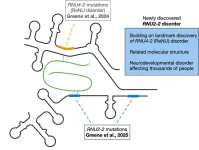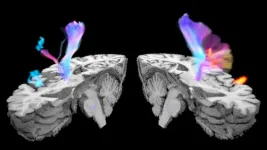(Press-News.org) Discussion of "alternative facts" has gained sad notoriety in US politics. Yet the question has been around much longer: How do people conduct political debates – is the focus more on facts or personal opinions? A team of international researchers led by the Cluster of Excellence "The Politics of Inequality" looked into the matter. The researchers examined political rhetoric in eight million speeches by members of the US Congress between 1879 and 2022 to see if the focus of their language was more on data and facts or personal convictions and subjective interpretations.
The team noticed a significant decline in the use of evidence-based political rhetoric since the 1970s, with a historic low in the present. Over the same period, the researchers observed a decline in legislative productivity, an increase in the political polarization of both political parties as well as growing economic inequality in the US.
Between facts and personal convictions
"In many democracies, there is currently much concern about 'truth decay': the blurring of the boundary between fact and fiction, not only fuelling polarization but also undermining public trust in institutions", explains lead author David Garcia, a professor of social and behavioural data science at the University of Konstanz. Together with his research colleagues in the UK, Israel, Austria and Germany, Garcia examined the political rhetoric used in congressional speeches over a period of more than 140 years. Their focus was on the question of how politicians express their conceptions of truth in their language: are they more likely to use objective facts or personal convictions?
"Productive democratic discourse balances evidence-based and intuition-based conceptions of truth", Garcia says. While evidence-based discourse provides a foundation for 'reasoned' debate, intuition contributes emotional and experiential dimensions that can be critical for exploring and resolving societal issues. However, if facts are given less weight and the balance is off, it jeopardizes political discourse. This is exactly the development the researchers have observed in the US' congressional speeches.
Between 1879 and the middle of the 20th century, the ratio of facts to intuition used in congressional speeches was relatively stable and balanced. After 1940, the balance even tipped towards facts and peaked in the mid-1970s. From 1976 to 2022, however, there was a significant, continual decline in the use of facts in congressional speeches, with a historic low in the present. Both US parties are affected by this downward trend, although the drop has been even steeper for Republicans since 2021. This negative trend not only applies to congressional speeches: the results are similar for analyses of Twitter/X posts by members of Congress from 2011 to 2022, the researchers say.
“One remarkable aspect of our results is the strong association between evidence-based language and performance,” co-author Professor Stephan Lewandowsky, Chair in Cognitive Psychology at the University of Bristol, says: “The more speeches in Congress reflect a reliance on evidence and facts rather than intuition, the better the performance of Congress and the less polarization between parties. Conversely, the increasing reliance on intuition-based language since the 1970s has been associated with a decline in performance and increasing polarization. Clearly it matters how politicians use language in the legislature.”
The method behind the study
How can you analyse eight million congressional speeches? The team led by David Garcia relied on computational data analysis methods. "We undertook a massive effort to track long-term trends in how the language of the U.S. Congress has evolved, by analyzing Congressional records spanning nearly fifteen decades," first author Segun Aroyehun explains. "We used advanced text analysis to assess the meaning of words in speeches and compared them to the meaning of words in dictionaries capturing conceptions of truth. This allowed us to observe the focus of speeches over time."
They started by identifying representative, distinctive key words linked to either evidence-based or intuition-based rhetoric. The list included 49 key words for fact-based language (e.g. terms such as "analyze", "data", "findings" and "investigation") and 35 key words for intuition-based language (e.g. "point of view", "common sense", "guess" and "believe").
The team then calculated the ratios of the respective categories of key words used in eight million texts. The resulting figure, EMI or "Evidence-Minus-Intuition", describes the relationship between evidence-based and intuition-based rhetoric. A positive EMI indicates a higher proportion of facts, while a negative value indicates a higher proportion of personal opinions.
The analysis method was developed in a previous project. Jana Lasser, who has been Professor of Data Analysis at the University of Graz since 2024, examined the linguistic patterns of Twitter posts by members of the US Congress between 2011 and 2022. “Even during this period, there was a change in the argumentation style”, explains Lasser. “Personal beliefs gradually gained in importance and were increasingly presented separately from scientific facts.”
Key facts:
Embargoed until Thursday, 10 April 2025, 11:00 CEST
(10:00 London time, 05:00 US Eastern Time)
Original publication: Segun Aroyehun, Almog Simchon, Fabio Carrella, Jana Lasser, Stephan Lewandowsky and David Garcia, Computational analysis of US Congressional speeches reveals a shift from evidence to intuition, Nature Human Behavior
DOI: 10.1038/s41562-025-02136-2
Link: https://www.nature.com/articles/s41562-025-02136-2
Computational analysis of the political rhetoric used in eight million speeches by members of the US Congress from 1879 to 2022.
Study by the Cluster of Excellence "The Politics of Inequality" at the University of Konstanz in cooperation with the Ben-Gurion University of the Negev, the University of Bristol, the University of Potsdam, the University of Graz and the Complexity Science Hub (Austria).
David Garcia is a professor of social and behavioural data science at the University of Konstanz. He is a member of the Cluster of Excellence "The Politics of Inequality" and the Centre for Human | Data | Society at the University of Konstanz. The computer scientist is an expert in the field of computational social science.
The Cluster of Excellence The Politics of Inequality at the University of Konstanz studies the political causes and effects of inequality from an interdisciplinary perspective. The research focuses on some of the most pressing issues of our time: access to and distribution of (economic) resources, the global rise of populists, climate change and unfairly distributed educational opportunities.
Note to editors:
A photo is available for download here:
https://www.uni-konstanz.de/fileadmin/pi/fileserver/2025_extra/der_siegeszug_des_bauchgefuehls_david_garcia.jpg
Caption: David Garcia is a professor of social and behavioural data science at the University of Konstanz. He is a member of the Cluster of Excellence "The Politics of Inequality" and the Centre for Human | Data | Society at the University of Konstanz.
Copyright: Ines Janas
https://www.uni-konstanz.de/fileadmin/pi/fileserver/2025_extra/der_siegeszug_des_bauchgefuehls_segun_port.jpg
Caption: Segun Aroyehun is PostDoc in David Garcia's Social Data Science Group at the Univesity of Konstanz.
Copyright: Segun Aroyehun
https://www.uni-konstanz.de/fileadmin/pi/fileserver/2025_extra/der_siegeszug_des_bauchgefuehls_jana_lasser.jpg
Bildunterschrift: Jana Lasser is a professor of Data Analysis at the University of Graz
Copyright: Uni Graz/Kanizaj
https://www.uni-konstanz.de/fileadmin/pi/fileserver/2025_extra/der_siegeszug_des_bauchgefuehls_stephan_lewandowsky.jpg
Caption: Stephan Lewandowsky is a professor of Cognitive Psychology at the University of Bristol
Copyright: Stephan Lewandowsky
END
The rise of "gut feelings" in US political rhetoric
Analysis of eight million political speeches reveals: never before have members of the US Congress based their rhetoric more strongly on personal convictions – and less on facts
2025-04-10
ELSE PRESS RELEASES FROM THIS DATE:
How mothers adapt to the metabolic demands of nursing
2025-04-10
Nursing poses major metabolic demands on mothers, to which they respond by eating more and saving energy to sustain milk production. There are significant hormonal changes during lactation, but how they lead to metabolic adaptations in nursing mothers remained unclear. In this study, which appeared in Nature Metabolism, leading researchers at Baylor College of Medicine and Pennington Biomedical Research Center uncovered a mechanism that connects prolactin, estrogen, the brain and metabolic adaptations during lactation.
“We worked with animal models to investigate ...
Caspian Sea decline threatens endangered seals, coastal communities and industry
2025-04-10
UNDER EMBARGO UNTIL THURSDAY 10 APRIL, 10AM LONDON TIME, 5AM EASTERN TIME.
Urgent action is needed to protect endangered species, human health and industry from the impacts of the Caspian Sea shrinking, research led by the University of Leeds has found.
Water levels in the Caspian Sea – the world’s largest landlocked water body – are getting lower, as hotter temperatures cause more water to evaporate than is flowing in. Even if global warming is limited to below 2°C, ...
Landmark study identifies new genetic cause of neurodevelopmental disorders, bringing long-awaited answers to families
2025-04-10
New York, NY [April 10, 2025]—A seminal study from researchers at the Icahn School of Medicine at Mount Sinai and their collaborators in the United Kingdom, Belgium, Spain, the Netherlands, and Iceland has uncovered a new genetic cause of neurodevelopmental disorders (NDDs). The discovery offers both closure and hope to potentially thousands of families worldwide who have long been searching for answers.
The study, published in the April 10 online issue of Nature Genetics [DOI: 10.1038/s41588-025-02159-5], reveals that mutations in a small, previously overlooked non-coding gene called RNU2-2 are responsible for relatively common NDD. Non-coding genes ...
Scientists create “metal detector” to hunt down tumors
2025-04-10
Researchers have created a “metal detector” algorithm called PRRDetect to hunt down vulnerable tumours, in a development that could one day revolutionise the treatment of cancer.
In a paper published today (Thursday 10th April) in Nature Genetics, scientists funded by Cancer Research UK and the National Institute for Health and Care Research (NIHR) analysed the full DNA sequence of 4,775 tumours from seven types of cancer. Based at the University of Cambridge and NIHR Cambridge Biomedical Research Centre, they used that data from Genomics England’s 100,000 Genomes ...
New USC study identifies key brain networks behind post-stroke urinary incontinence
2025-04-10
A new USC-led study using functional magnetic resonance imaging (fMRI) reveals the neural mechanisms that contribute to urinary incontinence, a common condition affecting stroke survivors that has a significant impact on their quality of life.
The research, just published in Stroke, was conducted by a multidisciplinary team of urologists, neurosurgeons, and imaging experts from the Keck School of Medicine of USC, Keck Medicine of USC, the Rancho Los Amigos National Rehabilitation Center, and the Shirley Ryan Ability Lab. The team discovered significant differences in brain activity during voluntary versus involuntary bladder contractions, presenting potential pathways for targeted therapies.
Urinary ...
Hidden potential in multiple disabilities
2025-04-10
Using eye-tracking — a technique for recording and analysing eye movements — a team from the University of Geneva (UNIGE) has shown that individuals with multiple disabilities can improve their social and emotional skills. Although these patients are often considered ‘‘untestable’’, nine young people have undergone personalised training over a period of one year, with promising results in terms of their ability to socialise. This work opens the way to new methods of assessment and support. It is published in Acta Psychologica.
Multiple disabilities involve a combination of severe intellectual and motor impairments, resulting in profound dependence. ...
How to protect bumblebee colonies safe from killer moths? Keep honeybee hives away from them
2025-04-10
Since the pandemic, we are very aware of the power of social distancing to protect against infectious disease. But can social distancing be effective if the infectious agent isn’t a virus or bacterium, but an insect powered by a brain and wings, and with the instinct to seek out new hosts?
Now, a study published to Frontiers in Bee Science has shown that physical distance does play a leading role in protecting bumblebees against a flying insect parasite, the bumblebee wax moth Aphomia sociella. The source of the potentially lethal infection was another species, namely nearby hives of domestic honeybees.
“Here we show that infestation with bumblebee wax moths is much greater ...
Rolling particles make suspensions more fluid
2025-04-10
Lacquers, paint, concrete—and even ketchup or orange juice: Suspensions are widespread in industry and everyday life. By a suspension, materials scientists mean a liquid in which tiny, insoluble solid particles are evenly distributed. If the concentration of particles in such a mixture is very high, phenomena can be observed that contradict our everyday understanding of a liquid. For example, these so-called non-Newtonian fluids suddenly become more viscous when a strong force acts upon them. For a brief moment, the liquid behaves like a solid.
This sudden thickening is caused by the particles present ...
Research fine tunes tools used to search for genetic causes of asthma
2025-04-10
Genome wide association studies (GWAS) have identified hundreds of genome regions containing thousands of genetic variants associated with asthma, but it’s still not clear which variants have an actual causal link to the disease. This “variant-to-function” gap is one of the biggest challenges to the usefulness of these genomic studies and has motivated researchers to develop new tools to make sense of GWAS results.
A new study by researchers from the University of Chicago combines genetic data and improved computational tools to look more closely ...
Meditation and critical thinking are the ‘key to meaningful AI use’
2025-04-10
People should learn to meditate and hone their critical thinking skills as AI becomes more integrated into daily lives, an expert suggests.
Digital strategy expert Giulio Toscani has spoken with 150 AI experts across 50 countries to understand the challenges and opportunities around human interactions with artificial intelligence.
He argues in his new book, Augmented: prAIority to Enhance Human Judgment through Data and AI, that as humans operate largely unconsciously by design, they are inclined toward immediacy and instant rewards, often overlooking potential ...
LAST 30 PRESS RELEASES:
Scientists show how to predict world’s deadly scorpion hotspots
ASU researchers to lead AAAS panel on water insecurity in the United States
ASU professor Anne Stone to present at AAAS Conference in Phoenix on ancient origins of modern disease
Proposals for exploring viruses and skin as the next experimental quantum frontiers share US$30,000 science award
ASU researchers showcase scalable tech solutions for older adults living alone with cognitive decline at AAAS 2026
Scientists identify smooth regional trends in fruit fly survival strategies
Antipathy toward snakes? Your parents likely talked you into that at an early age
Sylvester Cancer Tip Sheet for Feb. 2026
Online exposure to medical misinformation concentrated among older adults
Telehealth improves access to genetic services for adult survivors of childhood cancers
Outdated mortality benchmarks risk missing early signs of famine and delay recognizing mass starvation
Newly discovered bacterium converts carbon dioxide into chemicals using electricity
Flipping and reversing mini-proteins could improve disease treatment
Scientists reveal major hidden source of atmospheric nitrogen pollution in fragile lake basin
Biochar emerges as a powerful tool for soil carbon neutrality and climate mitigation
Tiny cell messengers show big promise for safer protein and gene delivery
AMS releases statement regarding the decision to rescind EPA’s 2009 Endangerment Finding
Parents’ alcohol and drug use influences their children’s consumption, research shows
Modular assembly of chiral nitrogen-bridged rings achieved by palladium-catalyzed diastereoselective and enantioselective cascade cyclization reactions
Promoting civic engagement
AMS Science Preview: Hurricane slowdown, school snow days
Deforestation in the Amazon raises the surface temperature by 3 °C during the dry season
Model more accurately maps the impact of frost on corn crops
How did humans develop sharp vision? Lab-grown retinas show likely answer
Sour grapes? Taste, experience of sour foods depends on individual consumer
At AAAS, professor Krystal Tsosie argues the future of science must be Indigenous-led
From the lab to the living room: Decoding Parkinson’s patients movements in the real world
Research advances in porous materials, as highlighted in the 2025 Nobel Prize in Chemistry
Sally C. Morton, executive vice president of ASU Knowledge Enterprise, presents a bold and practical framework for moving research from discovery to real-world impact
Biochemical parameters in patients with diabetic nephropathy versus individuals with diabetes alone, non-diabetic nephropathy, and healthy controls
[Press-News.org] The rise of "gut feelings" in US political rhetoricAnalysis of eight million political speeches reveals: never before have members of the US Congress based their rhetoric more strongly on personal convictions – and less on facts




